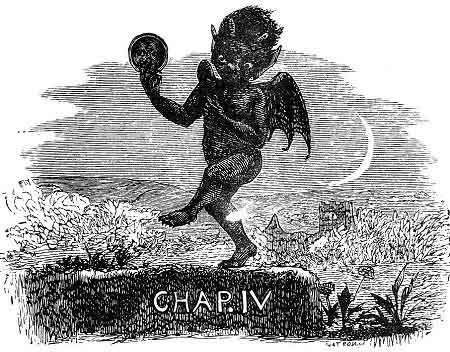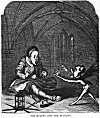
 |
Old Maggie Gill, for such was the crone's name, warned Robert Quayle and all those engaged in the good work that their efforts would be utterly useless, and their labour only thrown away.
The resuscitation of the old tale of the buggane caused much gossip and discussion in all the district round about, and the subject of the completion of the church was on every one's mind.
One day a very sanctimonious old tailor, named Timothy Mylrea, well known in that part of the country, and who was aspiring, if the church was completed, to fill the united offices of clerk and sexton, came to the Dooney-Mooar and told him he had on the previous night dreamed that Saint Trinion himself appeared to him, and said that if he, Timothy Mylrea, would, when the roof was finished, sit in the middle of the aisle during the night and make a pair of red cloth breeches, all complete, and walk nine times round the church, it would for ever frustrate the power of the malignant buggane to destroy the roof or otherwise injure the building, and dispel the charm that had hitherto for so many years either hindered or prevented its completion. He volunteered to do this, provided the coveted appointments of clerk and sexton were bestowed upon him. This was agreed to in the event of his being successful, and the work was commenced and pushed forward to completion. On the evening of the day on which the church roof was finished the valiant Timothy betook himself and his work to Saint Trinion's, and, with the good wishes of all his friends and neighbours, proceeded to make the red cloth breeches.
On entering the church and looking round, he saw that all was right and no one there but himself. He closed the door, lit and fixed three candles, arranged his work around him, sat down cross-legged on the floor, and commenced. Having cut out the breeches, he looked up and down and all about. No one appeared, and he took courage. He began to whistle, but his shrill piping sounded somewhat discordant and strange beneath the groined and arched roof of the church, and it suddenly struck Tim Mylrea that whistling was rather out of place in such an edifice. He threaded his needle and basted his work together. He gave another look
around the church, and finding no one appeared, his courage waxed stronger, and he began to sing--
A fierce lot they were
That came with him there,
And sailed up the fair River Lhane;
All trembled with fear,
And hid, far and near,
From terrible Orry the Dane.
The Dane, the Dane,
From terrible Orry the Dane.
"From whence do you come,
Bold Rover?" asked one,
"And where is your home--let us know?"
"My home is now here,
It once was up there,
In the land of cold, frost, and snow."
And snow, and snow,
In the land of cold, frost, and snow.
He stretched forth his sword
As he spoke the word,
And pointed right up in the sky-- p. 110
"The fair Milky Way
Was home yesterday,
Now here is my home till I die.
I die, I die,
Now here is my home till I die."
Orry ruled in Man,
And the land began
To thrive and to flourish with ease;
For good laws he made,
And taught the folks trade,
And founded the old house of Keys. 1
Of Keys, of Keys,
And founded the old House of Keys.
By the time his song was ended the breeches had far progressed towards completion, for stitching away as fast as his fingers could work, he had got one leg quite finished. Looking round again and seeing no one, neither elf nor mortal, Tim was getting quite elated, and thought it must be all stuff and nonsense about the buggane, and that there were no such things after all. Hearing a noise, he again looked up, and there straight before him, sure enough, was a head, appearing just out of the ground, and grinning most horribly at him with great goggle green eyes, distended nostrils, a wide mouth, and fierce fangish-looking teeth; altogether about the very ugliest sight Timothy Mylrea had ever beheld.
One glance was sufficient to convince him it was the veritable buggane himself, and that all his ideas of there being no such things were erroneous. But he was a plucky fellow was Tim Mylrea, and continued on with his work, keeping his eyes steadfastly fixed on the breeches and stitching away like a patent sewing machine.

Click to enlarge
TIM MYLREA AND THE BUGGANE.
"Timothy Mylrea," shouted the buggane, "what are you doing here?"
Tim took no notice, but went on with his work faster than ever.
"Do you see my head?" said the elf.
"Hee! hee!" replied Tim.
"Do you see my great eyes and my long teeth?" howled the buggane, getting enraged that the tailor was not frightened.
"Hee! Hee!" again replied the busy man, stopping his work one instant to snuff his candle with his fingers and pitch the severed wick at the head before him after which he went on with the breeches, which were now nearly completed.
Having by this time risen entirely out of the ground, the ugly little fellow, now furious at this last mark of Mylrea's contempt, began capering about in front of him, and grinning in his face all the time in the most hideous manner.
"Tim, you brute!" yelled the buggane. "You wretch! Do you see my strong arms, my ten fingers, my sharp nails, my big----"
Ere he could utter another word, up jumped the tailor, and, seizing his work, rushed as fast as he could out of the church. Hardly had he got clear of the door than down came the roof with an awful crash, that made him jump more nimbly than ever he did before. Hearing the fiendish, laugh of the buggane, he bounded off as hard as his legs would carry him, with the red breeches under his arm, along the road towards Douglas, and the infuriated little buggane after him. It was run tailor, run buggane. Away they went. Sure mortal man never ran so quick as poor, terrified Timothy, who, had he been possessed of the "three legs of Man," could not have got over the ground faster than he did with two.
Turning his head once to look over his shoulder, he saw his horrid, raving pursuer close upon his heels, with extended jaws and panting forth dreadful suffocating, sulphurous fumes that would have choked poor Mylrea had he not kept out of their reach. The buggane's hands were stretched forth, his claw-armed fingers were ready to clutch and tear him to pieces. The poor fellow's breath was almost gone, and he thought he really must
give up and fall into the terrible little creature's power, when at a turn of the road he caught sight of the Kirk Braddon before him, and, taking fresh courage and putting on a spurt, he redoubled his efforts.
If only he could reach the church he would be safe he knew, so he took fresh heart and made one more last effort. Running with increased speed the last few yards, he reached the churchyard wall, and, springing over like a deer into the consecrated enclosure, sank exhausted on the ground.
There, beneath the shadow of the church and once on holy soil, he felt safe from all the bugganes and elfins in the island. After taking a few breaths he looked up, and there on the wall could he see his arch enemy grinning, if possible, more horribly than ever, and spitting at him with all his might a perfect shower of sparks and liquid fire.
Fearing the little brute might injure him if any of his hellish spittle reached him, he got up and staggered nearer the church, where he lay down, crouching close to the sacred edifice, and just beneath the chancel window. The buggane, seeing his intended victim had really escaped, gave full vent to his maddened and infuriated rage, which now knew no bounds. After dancing and jumping about on the top of the churchyard wall--he dared not come actually within the precincts of the consecrated ground--and dancing about in the road outside, yelling out most dreadful curses and denunciations to the trembling and exhausted tailor, he made one last expiring effort to annihilate the poor frightened Timothy Mylrea. Seizing his own head in both his hands, and wrenching it off his body, the buggane hurled it over the wall, and, falling at the feet of Mylrea, it exploded like a torpedo, with a report that resounded over the country for miles, echoing from mountain to mountain like a peal of thunder. The noise of the explosion brought the alarmed people from their houses, running from all directions towards whence the noise proceeded to see what calamity had happened. There, in Kirk Braddon churchyard, was Timothy Mylrea found by his neighbours, and, wonderful to say, perfectly unscathed, but most wofully frightened.
On somewhat recovering himself he related all his adventures of the night
to the anxious crowd, all eager to hear what had befallen him; and, sanctimonious and well-conducted man that he was, he actually swore that nothing on earth should ever tempt him to volunteer to face the fairies or bugganes again, and that as long as he lived he would give the roofless church of Saint Trinion as wide a berth as possible.

Click to enlarge
THE BUGGANE'S LAST SHOT
A long discussion ensued among the heads of the parish as to what had caused him to fail at the last moment, as he had evidently up to the time of leaving the church complied with the instructions Saint Trinion had given
when he appeared to him in his dream and told him to make the red breeches. While the argument was going on the parson took up the nether garments to examine them, when he discovered that they were all complete, except one solitary button, which Mylrea had omitted to sew on, in his hurry to leave the church and get away from the little grinning buggane.
Whether, if he had not forgotten the button, the fully completing the red breeches would have broken the charm of the buggane's power and driven him from the church for ever, was long an open question, and one frequently discussed over many a glass of grog. Certain it is, however, that no one else has ever since attempted either to replace the roof on Saint Trinion's church or to exorcise the buggane that even to this day is said to haunt the ruins.
* * * * * *
The roofless church, now a mere picturesque ruin, stands in a field a little way from the roadside on the highway between Douglas and Peel, as a lasting memorial of
The buggane's vow, that Saint Trinion should
never have a whole church in
Ellan Vannin.
110:1 The House of Keys is the name of the Manx Parliament, which was originally founded by King Orry the Dane.